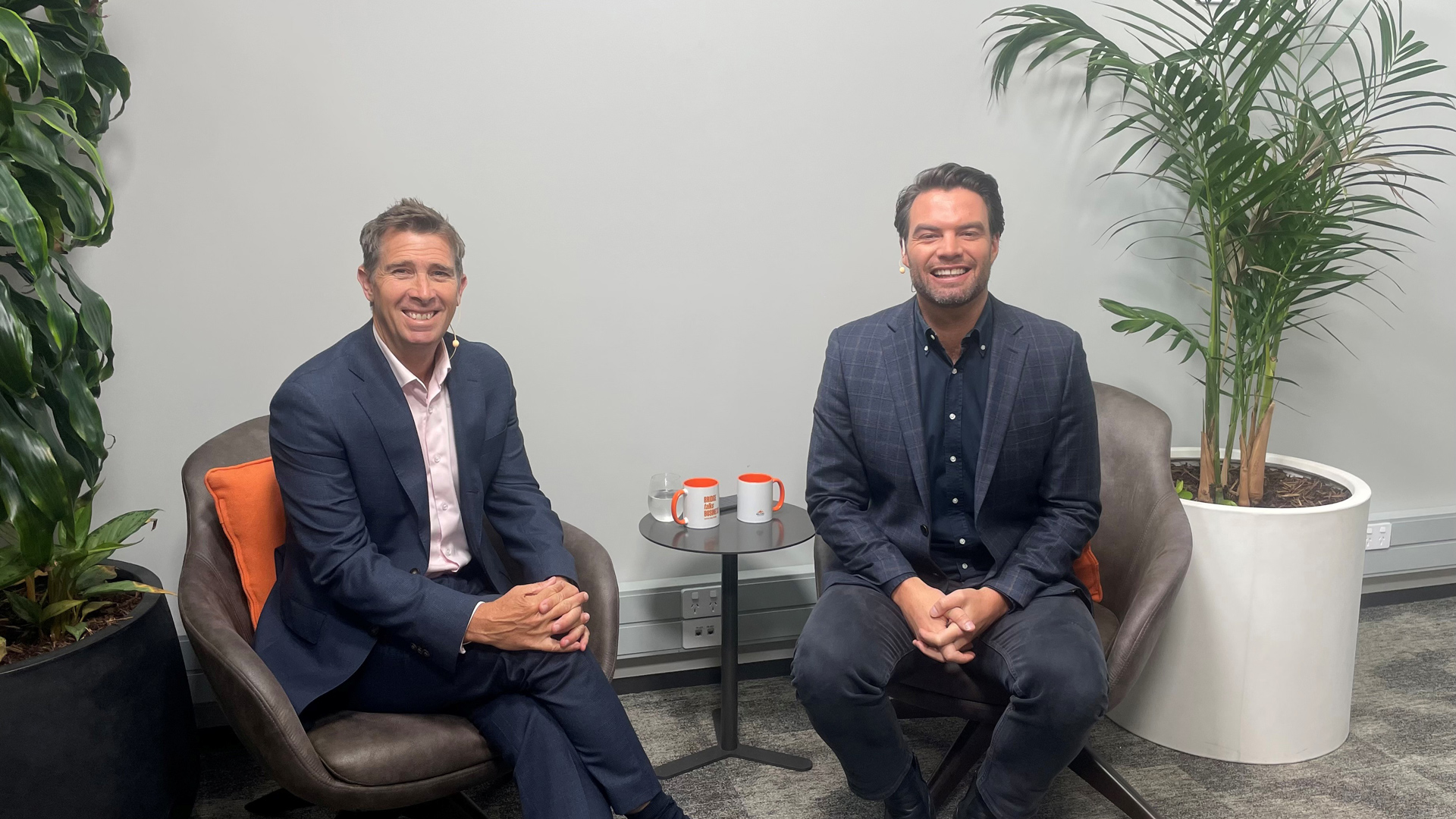Around 40% of New Zealanders solely rely on NZ Super in retirement, but is it really enough to have a comfortable lifestyle? Today on Bridge talks Business, Ryan Bridge meets with Retirement Commissioner Jane Wrightson to talk through her views on NZ Super, whether KiwiSaver should be compulsory, and possible changes to the retirement income policy.
Listen.
Click here to download the MP3 file or listen to the podcast on your favourite platform:
Read.
Bridge talks Business: 16 September 2025
Episode Transcript
Ryan Bridge
Kia ora. And welcome to Episode 48 of Bridge talks Business with Milford. Here’s some fast facts on retirement. You’ll get around $520 a week from the pension for a single person after tax, but according to Massey University, you’ll need more than $770 a week for a comfortable lifestyle with choices in a metro area. Now, according to my maths, you’ll be about $250 a week short.
So what makes up the difference? KiwiSaver? Investments? On this episode, I’m interviewing Jane Wrightson, the Retirement Commissioner, and I have some questions. Is there a magical age that you need to start saving or investing to fill that gap? First, here’s your top five business bits.
1. In the US, inflation up but less than feared. So investors take it as a win. Core inflation running at 3% year-on-year. Tariffs starting to bite but remain pretty modest. Non-tariff related prices are a bit stickier than expected.
2. Labour market data has been revised down there, the economy creating fewer jobs over the past 18 months than they previously thought. That means fewer jobs and some companies might start shedding – laying off workers.
3. That concern is showing up in consumer sentiment, with more people worried about job security. Add in the inflation woes and a period of stagflation is a real possibility.
4. The European Central Bank held rates steady last week even as they revised their inflation forecasts lower. This week, the US Federal Reserve is tipped to cut rates a quarter of a per cent because they’re worried about jobs or Trump’s wrath, or both. Inflation is running above target, so one could come to their own conclusions.
5. Back home, quarter two GDP data is out this week and will likely give up gains made in quarter one. Across the ditch, we get monthly Australian employment data, which will likely show it humming along quite nicely.
Ryan Bridge
So let’s crack into today’s episode and I’m joined by Jane Wrightson, who is the Retirement Commissioner. Just a reminder, this segment is informational only and should not be considered financial advice. Jane, welcome to the show. Great to have you.
Jane Wrightson
Thank you very much. Delighted to be here.
Ryan Bridge
Right. There’s so much I want to ask you about retirement and KiwiSaver and NZ Super. Let’s start with NZ Super. How affordable is it? We’ve seen lots of politicians come out with lots of headlines. How affordable is that at the moment?
Jane Wrightson
We are sitting bang smack in the middle of the OECD average. So that’s the good news. So at the moment it’s about four point something or other percent of GDP. It’s going to go up to about six and a half in the next 20 years. That’s minus tax. And I always think you should take the tax off, because let’s talk about net figures not gross figures. And that number is about halfway OECD average. So it’s affordable if we want it to be. This is more about government spending choices than it is about sending the country broke.
Ryan Bridge
Okay. But we also have health to think about from a government perspective, right? So there’s lots of other things at play. Lots of other countries have put the age up. Do you reckon we should.
Jane Wrightson
Again, we’re about on the middle. Most other countries are not at 65 yet. Australia is 67 and means tested, it’s true, with a very healthy retirement savings scheme. UK has just gone up to 67. They went up too quickly. So, interestingly enough, the number of women who plunged into pension poverty within a year rose like that because they didn’t give the long runway. But, you know, 65 is about in the middle. And the European countries, they’re still at their 60, 62, 63 level. So they’re the ones going up more rapidly.
Ryan Bridge
What about our pension system do you like? What are the successes of it?
Jane Wrightson
It’s the retirement income system, as I like to think of it. So you’ve got the NZ Super on one side and KiwiSaver on the other. And they are kind of intertwined. And you have to think of them collectively, because it’s important. The strengths of NZ Super are that it’s universal. You’ve only got to satisfy some residency requirements. It’s available to everybody at 65. It’s not means tested which means it’s very simple to administer. So those are its strengths. It’s weaknesses are is 65 the right number? That’s always a question. Is means testing a fair way of looking at any change as opposed to raising the age? Another good question. That’s more expensive, but it’s probably fairer.
And if you’re going to change things around NZ Super, you should also be thinking about the incentives and other nudges around KiwiSaver, because they are two sides of the same coin. NZ Super if you like, is your minimum basic income and KiwiSaver and your other savings is the private provision, is what you’ve got on top, which will get you closer to the standard of living you enjoyed while you were employed. That’s pretty much how you do it.
Ryan Bridge
Okay. It’s interesting because you say the standard of living you enjoy when you’re employed, and I think that’s what most people want, is for it to continue. And there’s lots of research done about a no frills retirement or, you know, slightly boushey retirement with some restaurants, maybe a holiday overseas once a year. There is a gap between what you get paid in Super and even the most basic living standards, right?
Jane Wrightson
You can live on NZ Super. 40% of people do. 40% of current pensioners live on NZ Super, and another 20% live on just a little bit more, so that 60% of current pensioners living, you know, on a very modest income basically. But you’re right, there’s not much room for frills. It depends on who you are and where you are as to whether you can make that work.
You know, if you’re healthy, if you’ve got public transport options, if you can grow your own vegetables, for instance, if your own needs are quite small, then it’s entirely doable. If you have higher aspirations, then absolutely. That’s when private savings provision comes into full swing. You need to be able to save and build up your own nest egg to afford the nicer things of life.
Ryan Bridge
Which is where KiwiSaver comes in, although it’s not compulsory, so you don’t have to make contributions to it. So is there a magical age? I’m 37. Is there a magical age at which you think … I was listening to a guy in the US who was saying, at sort of late 20s you should have started saving or investing, putting something away for your retirement. What’s your advice?
Jane Wrightson
I think it’s from the first pay packet, as ridiculous as it sounds.
Ryan Bridge
Really?
Jane Wrightson
Because the first pay packet – do you not remember? For that week or two, it’s the most money you’ve ever had, right? You go, oh my god, I’ve got all this money. And then within about six months you go, oh my god, I don’t have enough money. Now what’s changed is you and your spending habits, right? So along with paying off any debt you’ve got like student debt, I reckon you should be putting in a good chunk of money – let’s say it’s maybe 5% – into KiwiSaver from the get go. Because you won’t miss it at the first pay packet, right. And while that looks like a ridiculously long timeline for retirement, don’t forget that KiwiSaver also helps you get into your first home. So that’s why it should be of interest to young people. So I go first pay packet.
Ryan Bridge
Oh jeez, I thought late 20s was pushing it.
Jane Wrightson
If you haven’t started by the late 20s, get cracking.
Ryan Bridge
The other thing about KiwiSaver is the compulsion issue. Do you as Retirement Commissioner have a view on whether we make it compulsory, whether we need to up close contributions.
Jane Wrightson
I’m ambivalent about compulsion. I used to think it was a good idea until I started doing some data research and generally speaking, the people who are not contributing are either poor, having a life crisis or children or are not in work. Right? So they can’t. If you were to make it compulsory, I think what you would see is a correlating rise in the number of hardship applications to get the money back out again.
So that’s a kind of lose lose, right? In other words, people who are in KiwiSaver are in and once they’re there, it’s sticky. They’ll stay and then stop if they need to hold the money for bit and then carry on. So that’s good.
Contributions is always a great discussion. In Budget 25, the Government took one of our recommendations from a year or two back and said they would slowly increase it from three plus three employer / employee to four plus four. That’s a good move. There’s debate now about whether four plus four is the right number, particularly since they reduced the government contribution at the same time, which we hadn’t quite predicted. And they halved it for many and abolished it for some. So is the number five plus five, is the number six plus six? It kind of depends who you are. But four plus four as a minimum basis with options to increase is a very good start.
Ryan Bridge
Can you tell us about some of the income policy work that your department is currently working on?
Jane Wrightson
In about a month will be publishing a triennial review into retirement income policies. The government of the day commissions us to do it every three years under statute. We look at various issues around pensions, saving, retirement income, per say. We’re taking a deep dive into demographic data this time. I’m particularly interested in looking at women’s data and implications for women’s retirement, and what we might be able to do about that because women retire, generally speaking, with less income, gender pay gap turns into the retirement savings gap. It’s very clear.
Ryan Bridge
And they live longer and.
Jane Wrightson
And we live longer. That’s exactly right. So less money, longer to fund – very tricky hard stuff. The answer to that is women have to be really aware of this, because I didn’t become aware of any of this until I got this job. You know, I wasn’t listening, I wasn’t thinking. So the consciousness raising around the space is really important.
And that also then applies to employers and partners, and interested people. You know, if you’re a man, you should be thinking about your mother, sister, wife or daughter. Is there something you could be doing around their saving that would help? And the answer is yes, there are things you could do if you were able to. So that’s good.
So we’ll look at that. We’ll have a few recommendations around KiwiSaver. And we’ll be really talking about the need for cross-party support for a longer-term approach. The worst thing you can do in this system is to tinker.
Ryan Bridge
Tinker
Jane Wrightson
Yeah. Everybody hates it. Tinkering is the easiest thing to do when you’re in a government, because it allows you to tick something off, at least get something done through the great blancmange of activity in the government space. But it’s really important for trust and confidence in the system and for good settings and good outcomes, that the main parties and as many of the minor parties who will agree, can seek a long term direction for where we want to go. And that’s good for us, the citizens, because it gives us a timeline.
Ryan Bridge
And certainty. You need certainty.
Jane Wrightson
You need certainty.
Ryan Bridge
And once you reach a certain age and I feel like I’m kind of at that age now where I’m going, whoa, I really need to be seriously thinking about it – not thinking, but doing something about it.
Jane Wrightson
Are you only still thinking about it.
Ryan Bridge
No, no don’t worry.
Jane Wrightson
This is good.
Ryan Bridge
Milford’s got me on lockdown.
Jane Wrightson
Milford should have you absolutely sorted out.
Ryan Bridge
All right. So just one of the things that gets raised with me by people who are around my age is, I’m not really thinking too much about my retirement because people are working so much longer, but we’re also living longer, right? So does that really affect or does it come into your equations that you’re looking at?
Jane Wrightson
Well, I mean, people don’t generally start thinking about it seriously really I think until their 50s, you know, so there’s two things there. One is the financial provision you make throughout your life. That’s one thing. But the next thing is, what are you going to do when you are heading towards the end of your working life? And you can decide when that is if you’re lucky, you know, if you’re not laid off, if you don’t have an accident, if you don’t just wear out, if you’ve got agency over that, you can decide when you want to stop working. And the ideas around that are all, but particularly for people who have worked their whole life, is finding out in your own mind what it is you want to do, because work and its structure takes so much of our thinking, doesn’t it?
And you see this in male stats a lot. You know, the stories are real that a man stops working at 65, 66, 67 drops dead in six months time. Just kind of lost it, you know? So thinking about how you might step down, thinking about whether you’ve got a second career in you, not too late. If you hate what you’re doing now in your 40s and 50s, then now’s the time to get out and do something you love. You know? Thinking about the more holistic things. So it’s not just about financial provision. It’s about how do you want to live your life?
Ryan Bridge
That’s great advice. I’ve never really thought about it like that, but it does take up so much of your head space, doesn’t it. Is there anything from your own financial planning or retirement planning journey or lack thereof – I don’t know – that you wish you’d done differently over the years?
Jane Wrightson
The thing about working for the Retirement Commission and all my staff say it too, is that you learn so much, you know? So I’ve said it before that I look at my 20-something Jane and just put my head in my hands and go, oh, god. But don’t forget, that was at a time where financial advice was expensive. It was exclusive. Advisers were only really interested in you if you had any money. And of course in your 20s, you don’t much. So I made a couple of really bad decisions back then, not the least of which was walking out of an employer’s scheme because I thought I would never work in that in that sector again.
Ryan Bridge
You cashed in a question.
Jane Wrightson
I did, I cashed in, I bought a car because I needed a car. And then three years later I was back in that sector and went, oh dear. And this is one of the beauties of KiwiSaver, it’s portable. KiwiSaver solves that problem of moving sectors. Before then your choices were you only really had an employer scheme if you worked for a large employer, if you worked for the finance sector, if you worked for the government, everybody else had nothing.
Ryan Bridge
And now everybody has a chance.
Jane Wrightson
Everybody’s got a chance.
Ryan Bridge
And that was Jane Wrightson, who’s the Retirement Commissioner with a few words of wisdom for you on this episode. Just a reminder, you can like, follow and subscribe this podcast wherever you like to listen. We enjoy you doing so. Until next time, don’t forget invest in yourselves.
Missed previous episode? Don’t worry! Click here to catch up now.


